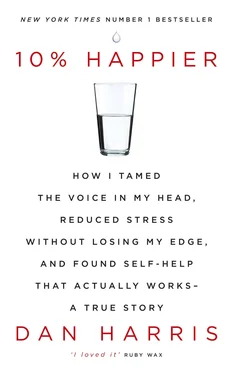Like any good coach, Ben was satisfying to please. He savored the little things—“grace notes,” as he called them. When he gave a shout-out to my work on the morning call, my chest swelled more than I cared to admit.
I got back into the habit of finding, pitching, and producing special reports, which I had neglected during my long slide into professional lethargy. I chased down the CEO of Philip Morris International on the street, and confronted him about the sale of cigarettes to young children in Indonesia. I reported on suburban moms who stole Adderall from their children. I investigated con men who ran a scam that involved calling people who had illegally ordered prescription drugs online and pretending to be DEA agents. They would threaten criminal charges, and then ask for bribes to make the case go away.
But the story of which I was proudest involved my spending two days locked up in solitary confinement. The idea was to bring attention to the growing national debate over whether this kind of incarceration was torture. My producers convinced the officials at the county jail in Denver to hold me for two days in a cell wired up with cameras. During this time, I endured boredom, bad food, claustrophobia, and the nonstop screaming of my fellow inmates, also in solitary, many of whom were having full-on nervous breakdowns. I awoke on the first morning to the animal howls of the inmate in the cell directly beneath me. It lasted for hours. Other inmates were hollering just to let off steam, including one troublemaker a few cells down, who, upon seeing our cameras, yelled out to no one in particular, “Yo, they’re making a movie! They should come suck my dick and make it a love story!” On my last day in captivity, as I was walking to the shower (mercifully, they only have solo showers in solitary) my mischievous neighbor shouted the following advice: “You need sandals, bro. You’ll catch gingivitis!”
My time in solitary was a humbling reminder of the limits of meditation—or, at least, the limits of my meditation abilities. I had cockily figured I could meditate through most of the experience, but the noise level and the lack of privacy—with cameras everywhere, and guards constantly peering in—made it nearly impossible. To make matters worse, whenever I tried to meditate, my neighbor, who couldn’t even see what I was up to, would uncannily break into “Karma Chameleon.”
My meditation also suffered when I was out covering breaking news, arguably the time when I needed it most. During the Penn State story, for example, in between live shots and filing deadlines, I would try to meditate in my hotel room, but I was often unable to fight through the fatigue.
In the midst of these intense work sprints, when I had less time to sleep, exercise, and meditate, I could feel my inner monologue getting testier, too—and I didn’t have the wherewithal to not take the voice in my head so seriously. I looked tired in my live shot this morning. I need a haircut. I can’t believe that Facebook commenter called me a “major clown.” The ego, that slippery son of a bitch, would use fatigue as an opportunity to sneak past my weakened defenses.
My increasing “story count,” as we call it, may have created difficulties in my meditation practice, but it was well worth it. And this was not the only area of professional improvement. I also made some progress on weekend GMA .
The upturn began one morning after the show, when Bianca found me sitting on the living room couch, once again watching and puzzling over some on-air moments with which I was dissatisfied. She grabbed the remote out of my hand and spontaneously began an hour-long clinic, starting at the top of the show and deconstructing exactly how and where I went wrong. The Hellos had started well enough that morning; I was smiling and laughing alongside my cohost. (Bianna was out on maternity leave, and her seat was filled by our excellent new overnight anchor, Paula Faris.) As we were all encouraged to do, Paula made an unscripted joke a few seconds into the show. Bianca pressed pause on the remote. “Look what happens right here. You tense up. You can literally see it.” It was true. Paula’s quip must have deviated from the preset plan for the Hellos that I had apparently constructed in my head, and I went stiff.
“You need to stop trying so hard,” said Bianca. “Just let go.”
It was delicious to have my wife throw Buddhist terminology back in my face. Especially since, in this case, she couldn’t have been more spot-on. I needed to approach anchoring more like meditation. If I could relax and be present enough to listen to what people were saying, it would enhance our natural camaraderie on the air.
Almost immediately, Bianca’s advice started to work. I found myself less preoccupied with strictly following a blueprint and more focused on just being there, in a good mood, ready with a tart comment—or equally ready to react to other people’s jokes with genuine, unforced laughter. So, for example, when Ron read a news item about women being happier if they had a few drinks a week, I responded by saying I would be stopping by the liquor store on my way home. I was starting to realize that by “leading man,” Ben wasn’t asking me to be Errol Flynn, but instead to be comfortable in my own skin.
While things were going well on various fronts at work, it was certainly not all sweetness and light. Ben’s praise emails were equally balanced by notes that contained extremely precise (albeit polite) criticism. For example, he razzed me a bit for my use of the overly technical term precip when introducing Ginger Zee’s rainy forecast on weekend GMA . More seriously, when I raised my hand to cover the United States’ withdrawal from Iraq, I didn’t get the nod. Furthermore I did not land a role in ABC’s special coverage of the tenth anniversary of 9/11, the event that had been a turning point in my personal and professional life. This exclusion nearly sent me right back down to the subbasement. It was clear there was something still missing from my strategy.
During my most recent dinner with Mark, the one at the Japanese restaurant, I had, as always, placed my iPhone on his side of the table, so I could use it to record what he said for future reference. (I carried both a BlackBerry and an iPhone. Belts and suspenders.) Listening to our chats after the fact, I often found myself rooting for Mark as his thoughtful answers were continually interrupted by an amped-up interrogator, interjecting non sequiturs, half-baked theories, and partially realized insights, with a mouth filled with mindlessly consumed food.
On the tape, I could be heard lamenting the fact that after years of contemplating the balance between ambition and equanimity, I still didn’t have an answer. Whereupon Mark, in his understated way, told me that he did. “The answer is in nonattachment,” he said. In my defense, the term was deceptively bland. “It’s nonattachment to the results. I think for an ambitious person who cares about their career—who wants to create things and be successful—it’s natural to be trying really hard. Then the Buddhist thing comes in around the results—because it doesn’t always happen the way you think it should.”
As I mulled this advice after the fact, I suspected there might be something to it, but I couldn’t quite figure out how you could work your tail off on something and then not be attached to the outcome. I had come up through a system that venerated bootstrapping and a fierce refusal to fail. Doing this without attachment didn’t seem to fit the paradigm.
A few months later, at our next meeting over eggs at Morandi, I broached the subject again. I said, “When we last spoke, you said it’s okay to be ambitious, but don’t be attached to the results. I cut you off, as I usually do—but what does that mean?”
Читать дальше












